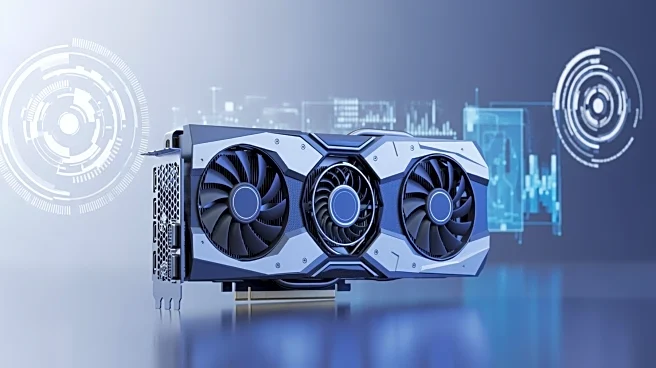What's Happening?
Citi Research has increased its price target for Nvidia to $720 from $650, reflecting strong demand for Nvidia's AI processors. The firm highlighted Nvidia's leadership in artificial intelligence computing, driven by the popularity of its H100 chips and anticipation
for its next-generation Blackwell GPUs. These products are expected to support data centers through 2026 as companies expand their AI infrastructure. Despite concerns over chip supply constraints and pricing fluctuations, Citi emphasized Nvidia's strategic advantages, including its relationships with cloud giants, robust software ecosystem, and developer tools, which help maintain its competitive edge.
Why It's Important?
Nvidia's position as a leader in AI computing has significant implications for the tech industry and the broader economy. The company's processors are crucial for powering AI applications, which are increasingly integral to business operations across various sectors. Nvidia's growth reflects the rising demand for AI technology, which is reshaping industries from healthcare to finance. The increased price target suggests confidence in Nvidia's ability to sustain its growth trajectory, potentially influencing investor sentiment and stock market dynamics. Companies relying on AI infrastructure may benefit from Nvidia's advancements, while competitors face challenges in matching its capabilities.
What's Next?
Nvidia's upcoming earnings report will be closely watched by investors seeking confirmation of its growth potential. The report may provide insights into how Nvidia plans to address supply constraints and pricing issues. Additionally, the performance of its new Blackwell GPUs could impact future market strategies and partnerships. Stakeholders, including cloud service providers and AI developers, will likely monitor Nvidia's developments to align their strategies with emerging trends in AI technology.
Beyond the Headlines
Nvidia's dominance in AI computing raises questions about market competition and innovation. As Nvidia continues to expand its influence, regulatory scrutiny may increase, focusing on antitrust concerns and the impact on smaller competitors. The company's role in shaping AI infrastructure also highlights ethical considerations, such as data privacy and the societal implications of AI deployment. Long-term, Nvidia's advancements could drive shifts in workforce dynamics, requiring new skills and training in AI-related fields.















